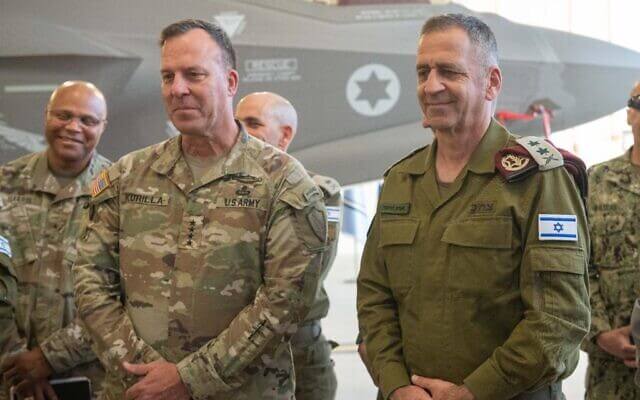In Israel, Israeli Defense Forces Chief of Staff Aviv Kohav said last week that the United States and Israel were developing what he called "joint" capabilities to counter the Islamic Republic of Iran and its terrorist proxies in the region.
The latest development comes as the new conservative coalition under Likud leader Benjamin (Bibi) Netanyahu vows to crack down on Islamic terrorism and deter Iranian aggression.
According to reports, General Michael Erik Kurilla, head of the U.S. Central Command (CENTCOM), finished his fourth official visit to Israel since entering the role in Spring.
In remarks to reporters published by the IDF, Kohavi stated that the Jewish state and the U.S. were "developing joint military capabilities at an accelerated rate" against Iran and other threats across the Middle East region.
The IDF said that General Kurilla engaged in a meeting with Kohavi and other senior Israeli officers regarding Jerusalem's efforts against Iran's ambitions of establishing a powerful military presence in Syria and its weapons transfer to the Lebanese Shiite terrorist group Hezbollah.
Among other generals participating in the meeting were Oded Basiuk, head of the Operations Directorate Ori Gordin, along with the head of the Northern Command, Tal Kelman, the military official in charge of Iran affairs, and Hidai Zilberman, defense attaché to Washington.
Reports indicate that Major General Gordin gave Kurilla a tour of Israel's Northern frontier, detailing Hezbollah's activities in Southern Lebanon and of Iranian-affiliated groups in Syria.
General Kurilla was given a tour by the Israeli Air Force chief Tomer Bar of the Nevatim Air Base in the northern Negev desert, an area near the Gaza Strip, where the IAF's fleet of F-35i stealth jets is housed. Throughout the tour at Nevatim, both officials discussed the threats in the Middle East and plans for joint use of force.
Kohavi expressed his appreciation for "close cooperation with U.S. Armed Forces." The IDF official further stated that both nations are committed to "operating together on all fronts to gather intelligence, neutralize threats, and prepare for various scenarios in either one or multiple arenas."
"We are training and developing joint military capabilities at an accelerated rate in the face of developing threats in the Middle East, and against the Iranian regime in particular," Khovai stated.
With the election of Israel's conservative parties and their vows to crack down against Islamic terrorism, many experts believe that the latest developments by CENTCOM and the IDF will continue to strengthen in the coming months.
During his tenure as Israel's Prime Minister, Bibi Netanyahu enacted policies to increase the military capabilities of Israel and American Israeli military cooperation.
Under the Netanyahu government, Israel and moderate Arab nations like Bahrain, Morocco, and the United Arab Emirates (UAE) signed the Abraham Accords to normalize relations, engaging in economic and military cooperation.
With the growing influence of the Islamic Republic of Iran throughout the Middle East, Israel and its new allies have engaged in intelligence sharing, building up military equipment, and military drills.
With negotiations over the Iran nuclear program on hold, many believe that the incoming Netanyahu government will continue to ramp up the IDF's efforts to prepare a credible military threat against Tehran's nuclear sites while relying on CENTCOM to aid in their operation.









